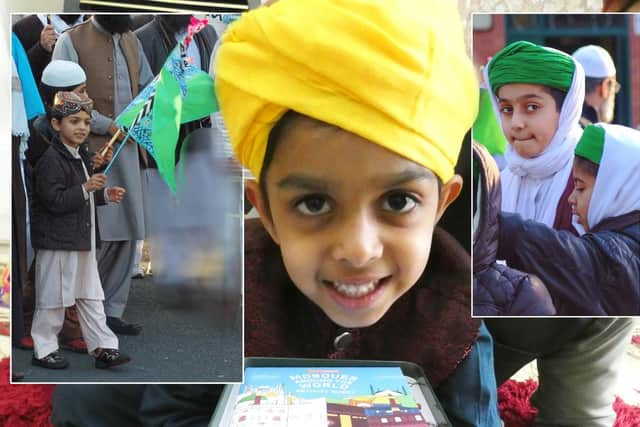Families in the district join millions across the world for Eid celebrations
and live on Freeview channel 276
The Islamic festival of Eid-Ul-Adha usually lasts for three days and came to its climax over the weekend.
This Eid is celebrated by Muslims to remember the story of Abraham’s obedience to the Lord when he became ready to sacrifice his own son Ishmael upon God’s command.
Advertisement
Hide AdAdvertisement
Hide AdIt was a test of his faith and instead a ram sent from Heaven was sacrificed.


Mosques and Muslim households throughout our Kirklees region were busy last week getting ready for the festivities.
Local barbers’ shops were packed out with children and young people waiting for their customary haircuts.
Muslim bakeries in the area also got inundated with large orders for special Eid cream cakes as well as requests for other mouth-watering desserts.
Advertisement
Hide AdAdvertisement
Hide AdMaddrassah schools have been closed as part of Eid-Ul-Adha holidays for the children. Most Kirklees state schools in Dewsbury, Batley and in Heckmondwike also allowed their Muslim pupils to take an optional two holidays on Monday and Tuesday.
Senior Muslim Scholar of Kirklees and Head Imam at the Kanzul-Iman Jamia Mosque in Heckmondwike, Mufti Allama-Moalana Shamsul-Huda Khan Misbahi spoke to the Reporter Series and said: “Eid-Ul-Adha reminds Muslims about the story of prophet Abraham’s sacrifice. But the festival of Eid-Ul-Adha also teaches Muslims to think about sacrifice in its much wider form.
It teaches Muslims to go the extra mile by looking after our neighbours.
“We have all been created by the same God, and we are all part of the same human family.
Advertisement
Hide AdAdvertisement
Hide Ad“We share the same planet, we breathe the same air, and it’s very important for all of us to sacrifice our time just to be there for each other.”
The festival of Eid-Ul-Adha takes place in the month of Zil-Hajj, which is the 12th and final month in the Islamic calendar.
It also signals the time when a large number of Muslims from across the globe begin their sacred Hajj pilgrimage to the holy sites of Mecca and Medina in Saudi Arabia.
An important aspect of this sacred Hajj pilgrimage for Muslims, besides praying at the main religious sites, is to practice Abraham’s ritual of sacrificing an animal such as a camel, cow, goat or a sheep. A butcher is paid to perform the ritual.
Advertisement
Hide AdAdvertisement
Hide AdMeat from the sacrifice is then given out free to those who are poor, or starving, or to those families who are living on low incomes.
Others who get the meat are people affected by famine or natural disasters.
There are three different types of Eid festivals celebrated by followers of the Muslim faith.
The first in the Islamic calendar is Eid-Milad or known as “Eid-Mawlid”, marking prophet Mohammad’s birthday celebrations.
Advertisement
Hide AdAdvertisement
Hide AdThe second is Eid-Ul-Fitr, which is celebrated immediately after Ramadhan to mark the end of the holy month of fasting.
The third and final one is Eid-Ul-Adha.
Many Muslim families came together over this year’s “Eid weekend” to enjoy outdoor feasts in the garden sunshine.
Traditional Indian cuisine such as the popular Biryani rice was served with a variety of different curries. The meal was topped up with samosas and kebabs.
Tasty desserts like Halwa, ice cream and trifle also came out of the fridge for the children.
Advertisement
Hide AdAdvertisement
Hide AdBut the active weekend did not just end after Eid was over. Most Muslim pupils returned to school on Wednesday to get ready for the annual sports days, or were looking forward to an end of year trip.
The month of Zil-Hajj has this year coincided with a period when schools are preparing to close for the summer holidays.
The Muslim new calendar year will have also begun when children arrive back to school during the following month of Muharrum (September).